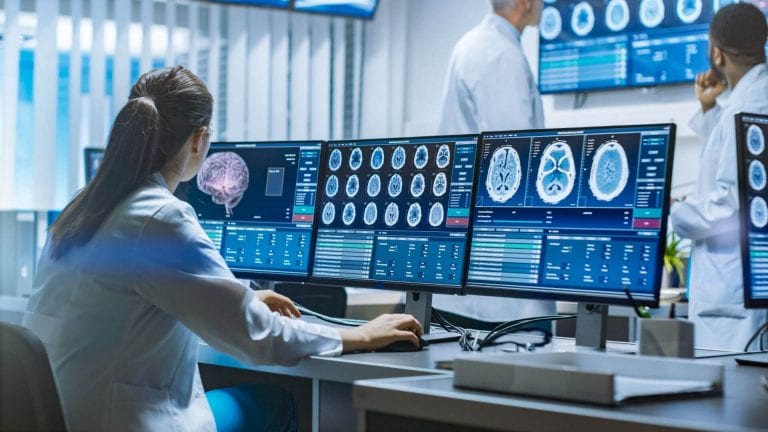
One of the largest Parkinson’s disease research centers in the world, conducting ongoing programs for PD (motor and non-motor symptoms), essential tremor, Lewy body dementia, PSP and MSA.
A prevention clinical trial aims to assess the effectiveness of various interventions that may delay or prevent the onset of PD. Potentially improving the quality of life in individuals who are at high risk or show prodromal signs of the condition.
Newly diagnosed patients may be eligible to participate in clinical trials aimed at improving outcomes or developing new treatments for their specific condition.
Genetic clinical trials for Parkinson’s disease involve studying the role of genetic factors in the development and progression of the condition. These trials aim to identify specific genes or genetic mutations that may contribute to Parkinson’s disease, as well as potential targets for treatment or interventions.
“Off” episodes refer to periods of time when the symptoms of the condition become more pronounced or severe. These off episodes are characterized by a re-emergence or worsening of motor and non-motor symptoms despite ongoing treatment with medications.
Dyskinesia refers to a movement disorder characterized by involuntary, abnormal, and often repetitive muscle movements. These movements can be excessive, unpredictable, and may occur in various parts of the body. Dyskinesia can affect both voluntary and involuntary movements and can be classified into different types based on their characteristics and underlying causes.
Memory loss and dementia are common cognitive impairments associated with Parkinson’s disease (PD), although not all individuals with PD develop these symptoms. Parkinson’s disease dementia (PDD) typically occurs in the later stages of the disease, but it can also manifest earlier in some cases.
Common non-motor symptoms associated with Parkinson’s disease include: cognitive changes, mood disorders, sleep disturbances, difficulty swallowing, urinary problems, constipation and fatigue.
In Parkinson’s disease, tremor is one of the primary motor symptoms that many individuals experience. It is often characterized by rhythmic, involuntary shaking or trembling of a body part, typically the hands, fingers, or arms.
An observational clinical trial, also known as an observational study or non-interventional study, is a type of research design that aims to observe and analyze the natural course of a disease, condition, or treatment without actively intervening or manipulating any variables.
Characterized by the gradual deterioration of certain brain cells in areas controlling balance, eye movements, coordination, and cognition. PSP is considered a form of atypical Parkinsonism, meaning it shares some similarities with Parkinson’s disease but also has distinct features.
A rare neurodegenerative disorder that affects the autonomic nervous system, which controls involuntary bodily functions such as blood pressure, digestion, bladder control, and heart rate, as well as the motor system responsible for movement. It is characterized by the progressive degeneration of specific areas of the brain, leading to various symptoms and functional impairments.
A progressive neurodegenerative disorder that affects brain function. Symptoms of Lewy body dementia can vary but generally include cognitive problems such as difficulties with memory, attention, and problem-solving. People with LBD may also experience visual hallucinations, fluctuations in alertness and attention, and motor symptoms like rigidity, slow movement, and tremors.
Essential tremor, also known as benign essential tremor or familial tremor, is a neurological disorder characterized by involuntary shaking or tremors in different parts of the body. It is the most common movement disorder, affecting an estimated 1% to 5% of the population, and it tends to run in families.
A condition characterized by muscle stiffness and involuntary muscle contractions, which may lead to muscle spasms or jerking movements that can be unpredictable and uncontrollable.
Dystonia is a neurological movement disorder characterized by involuntary muscle contractions that cause repetitive or twisting movements and abnormal postures. These muscle contractions can be sustained or intermittent and may affect a specific body part or multiple regions of the body.
At the screening visit consenting patients will be screened for eligibility according to study specific inclusion/exclusion criteria within 8 weeks before start of Investigational Medicinal Product (IMP) administration. A diary concordance training will be performed and following the screening visit the patient will be asked to self-administer three 24-hour home diaries and to bring the completed diaries to the baseline visit for assessment prior randomization.
At the baseline visit, patients will be randomized to receive one of three doses of mesdopetam (dose 1, dose 2 and dose 3) or placebo b.i.d.
During the first week a dose run-in phase will take place, where all patients allocated to mesdopetam will receive a run-in dose of mesdopetam twice daily and patients allocated to placebo will receive placebo twice daily. At Visit 2, patients will receive mesdopetam dose 1, dose 2 or dose 3 or placebo b.i.d., as randomized and continue the same dose for the rest of the treatment period until EOT. Dose reductions are restricted and the dose can only be reduced once. Dose reductions are permitted from visit 2 (day 9) until visit 3 (day 28), where after the dose should be kept stable until EOT.
Read More
Approximately 66 male and female subjects with Parkinson’s disease, on a stable dosage of levodopa but with an average of ≥ 2 h total OFF time/day and not less than 1 h per day, will be enrolled. Following baseline safety and efficacy assessments, subjects will be randomized to receive once-daily doses of either low-dose CVN424, high-dose CVN424, or matching placebo. All subjects not randomized to placebo will initiate treatment with a low-dose of CVN424 on Day 1; the low-dose arm will continue to receive their low dose each day, while the high-dose arm will increase their daily dosage to the high-dose CVN424 beginning on Day 8 ±2 days and continuing thereafter. Study drug will be self-administered each morning as an oral suspension. Subjects will continue their other PD medications.
Read More
ADX48621-301: Phase 2b/3, Randomized, Double-blind, Placebo-controlled, Parallel Group, Multicenter Study to Evaluate the Safety and Efficacy of Dipraglurant (ADX48621) for the Treatment of Dyskinesia in Patients with Parkinson’s Disease Receiving Levodopa-based Therapy with or without Concomitant Dopaminergic Medications
NYX-458-2006
A Study to Evaluate NYX-458 in Subjects With Mild Cognitive Impairment or Mild Dementia Associated With Parkinson’s Disease, or Prodromal or Manifest Lewy Body Dementia
Irl790c005: A Randomized, Double-blind, Placebo-controlled Phase Iib Study Evaluating The Efficacy Of Mesdopetam On Daily On-time Without Troublesome Dyskinesia In Patients With Parkinson’s Disease
CVN424-201: A Phase II, Randomized, Double-Blind, Placebo-Contolled, Multicenter Study of CVN424 in Parkinson’s Disease Patients with Motor Fluctuations
A Multicenter, Randomized, Active-controlled, Double-blind, Double-dummy, Parallel Group Clinical Trial, Investigating the Efficacy, Safety, and Tolerability of Continuous Subcutaneous ND0612 Infusion in Comparison to Oral IR-LD/CD in Subjects With Parkinson’s Disease Experiencing Motor Fluctuations (BouNDless)
Auricular Muscle Zone Stimulation for Parkinson Disease (Earstim-PD)
Clinical research – also referred to as clinical research trials, are conducted in order for medical researchers to decipher just which therapies or interventions are the most effective and safe to detect, treat or prevent a disease such as Parkinson’s disease (PD) and other neurodegenerative conditions.
Not only do clinical trials look at the effectiveness and risks of specific treatment interventions or drugs, researchers also evaluate other aspects of medical care, such as how to improve the quality of life for people with chronic illness such as PD.
Click link below to listen to Dr. Isaacson’s webinar with the Micheal J. Fox Foundation!
Podcast: Volunteering for Parkinson’s Research: What to Know and Expect


There are several different phases of a clinical trial, each developed in order to help researchers answer different questions. Phases include: Phase I – an experimental drug or treatment is tested in a small group of between approximately 20 and 80 participants to test a drug or treatment’s safety and identify any side effects Phase II – an experimental drug or treatment is tested in a larger group of approximately 100 to 300 participants in order to continue to evaluate its safety Phase III – an experimental drug or treatment is given to a very large group of (on average) approximately 1,000 to 3,000 participants (could be more or less) in order to compare it with standard treatment and gather information on side effects and safety Phase IV – after the drug has been FDA approved, studies continue in order to track of its long term safety and effectiveness as well as its optimal use
What is a Double Blind Placebo Study? In a single blind placebo study, participants are NOT aware of whether they receive the real drug being tested or a placebo (“sugar” pill with no therapeutic effect whatsoever). This study reinforces the fact that participants are not subject to being influenced in any way by how they anticipate the reaction to the experimental drug to be. In a single blind study, only the participant is NOT told whether she/he is taking a drug or a placebo. A double blind study involves none of the members of the research team (including the participants) being told which group is getting the investigatory drug or which group will get the placebo.
The Good News Regarding Clinical Trials – Those who have been newly diagnosed with AD and their caregivers and family members may be very interested to know that there are some great benefits to becoming involved in local research trials.
Benefits of Becoming Involved in Clinical Trials – Participants get to take an active role in their plan of care Individuals involved in clinical trials contribute to helping others Many clinical trial participants receive free medical care by experts in their respective field of medicine Those involved in clinical research receive the latest in medical advances before they are available to the general public Participants may be able to continue treatment/medication even after the clinical trial is over Those with chronic untreatable illnesses gain hope for a brighter future or perhaps even a cure for the disease Clinical trials can provide a positive milieu in which participants can seek the support of others going through the same experiences regarding their disease The benefits of clinical research trials must be weighed against the risks in order for each participant to decide if the trial is in his/her best interest. There may be serious side effects of any clinical trial (some could even be life threatening). The amount of time required for the trial must also be taken into consideration. Some trials require hospital stays and/or frequent lab tests. The potential benefits and risks of a research study must be explained to all participants before and during the study through a process called “informed consent” before each person involved in the study agrees to participate or continue the study.
After the Research Trial is Complete – Once the clinical trial is complete, the information gathered is examined in detail and then a decision is made regarding moving on to the next phase of the study. If the research reveals that the treatment is ineffective or unsafe, the decision to stop the testing will be made. Results of clinical trials may be published in scientific journals or perhaps featured in the media. Once a new drug or treatment has been deemed safe and effective by clinical trials, it may even be adopted as the standard of care by medical professionals.
What Choices Do I Have?
You are at no obligation to use this website or sign-up for any clinical research studies. If you do not want to participate, you should not provide any information or register as a member of a study.
How Is Information Collected About You Used?
We may use information we collect about you to:
• Respond to your inquiries via the Contact Us page
• Send you follow-up email announcements and reminders if you Opt-in
Do We Share Your Information with Anyone?
No, we will not disclose any Personal Information about you. We do not make your Personal Information available to third parties for their marketing purposes.
How Do We Secure and Retain Your Information?
We have strict technical, physical, and administrative safeguards to protect the Personal Information that we collect.
Have a Question? Contact Us
Please reach out to us via the Contact Us pages if you have any questions about this Privacy Policy.